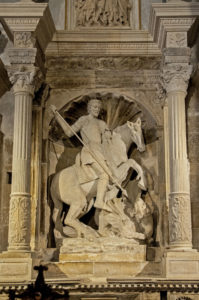 The fact that Ragusa was divided meant that each city had its own
patron saint
The fact that Ragusa was divided meant that each city had its own
patron saint
. But when they were reunited, abolishing one of the saints was unthinkable. So in Ragusa Ibla, St. George is celebrated on the 23rd of April, and St. John on the 29th of August.
Two feasts with no one left out! All citizens actively take part in the events.
St. George is one of the world’s most famous and revered saints. He is the patron saint of England and Portugal, and even a crater on the moon has been named after him. Unfortunately, the stories about St. George’s life and martyrdom are abundant and conflicting.
The most famous story tells of the slaying of a dragon to save a young girl.
 In Sicily, St. George has been worshipped since the 5th century, only becoming so renowned and important in the 11th century.
In Sicily, St. George has been worshipped since the 5th century, only becoming so renowned and important in the 11th century.
In 1063 the Norman army led by Robert Guiscard defeated the Arabs, and were led to victory with the help of St. George.
The 29th of August is dedicated to St. John the Baptist. The saint lived in the desert, eating insects until he could undertake God’s mission. His task was to spread the word of God and erase sin through Baptism.
The saint was imprisoned in the dungeons then beheaded by order of Herod the Great.
The saint’s worship spread throughout the world very quickly.
A life of renunciation and penance made him an immediate role model.